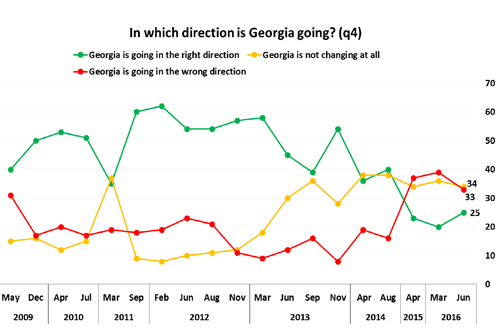
Source: NDI/CRRC public opinion survey, June, 2016
U.S. National Democratic Institute (NDI) released its commissioned public opinion survey, fielded by CRRC between June 8 and July 6, which shows respondents’ attitudes towards broad range of issues, among them foreign policy.
Number of respondents who think that Georgia is going in the “wrong direction” has declined to 33% in June, compared to 39% in March 2016, 45% in November 2015, and 37% in April, 2015.
25% of respondents think that Georgia is moving in the “right direction”, up from 20% in March and statistically same as in April, 2015.
34% think that Georgia is “not changing at all”, according to the survey during which 4,113 respondents were interviewed; it has a margin of error plus, minus 2.1%.
17% of respondents described their household situation as “better off” since October 2012, a seven percentage point increase since March 2016.
Number of those who think that they are “worse off” declined from 42% in March 2016 to 32% in June.
51% said their household situation is the same since the October 2012.
There were also small improvements in respondents’ perception that the government is making decisions that matter to them, up to 42% from 37% in March, 2016.
Source: NDI/CRRC public opinion survey, June, 2016
“Affordable healthcare” was the only area in the list of issues, where the majority of respondents (55%, up from 51% in March) think situation has changed for better since the previous parliamentary elections in October, 2012.
Jobs and poverty were ranked as the most pressing issues, followed by the territorial integrity, rising prices and pensions.
Foreign Policy
Source: NDI/CRRC public opinion survey, June, 2016
72% of respondents, down from 77% in March, support government’s stated goal to join the European Union.
The survey shows that this support is stronger among the younger population and declines to 64% among respondents 56 and older.
The support for the EU membership is at 50% in settlements with predominantly ethnic minority groups; 24% of respondents in these settlements are against and 26% “do not know”, according to the survey.
64% of respondents believe that they will benefit from visa waiver for the Georgian citizens in the Schengen area, a decline from 72% in March, 2016. Last-minute objection from Germany in June dashed Tbilisi’s hopes to finalize EU visa liberalisation process this summer, delaying it at least till autumn.
68% of respondents said they approve government’s stated goal to join NATO, which is a four percentage point decline compared to March, 2016.
Support for NATO membership declines to 47% among respondents in the settlements with predominantly ethnic minority groups; 27% of respondents in the same settlements “do not know”.
On question what should be Georgia’s foreign policy, 48%, down from 52% in March, chose the answer: “pro-Western, however, we should maintain good relations with Russia”.
On the same question, 20%, up from 16% in March, responded: “pro-Russian, however, we should maintain good relations with EU and NATO”.
13% respondents, statistically the same as in March, chose the answer: “pro-Western,” and 6%, same as in March, – “pro-Russian”.
Advanced analysis of the survey, according to its authors, shows that if the respondents receive information from foreign TV channels, they are more likely to be pro-Russian. 23% of respondents said the watch news and current affairs coverage on foreign, mostly Russian television channels.